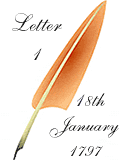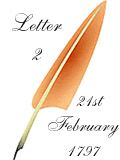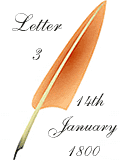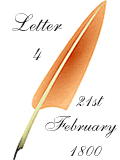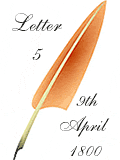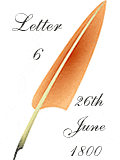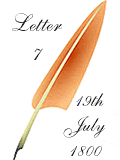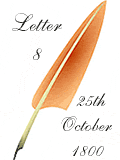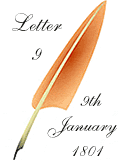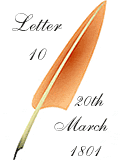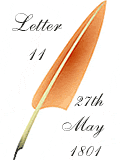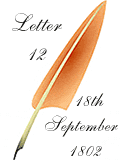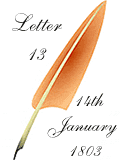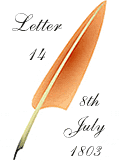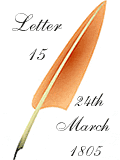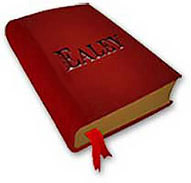CLICK on a quill* to access each letter.
Eleonore Muzard was the younger half-sister of our great-great-great-great-grandfather, Jean/John Chopin. Both were born in Isle-de-France (present-day Mauritius), but their lives were disrupted by the outbreak of the French Revolution and, while her brother headed off to make his fortune in India, Eleonore returned with her parents to their mother-country, France. Father Michel Muzard owned properties in Haiti and Cuba, the family living comfortably off the proceeds of the coffee, tobacco, sugar and cotton trades. The Haiti Rebellion put an abrupt end to that, and a life of genteel indebtedness began in France. Eleonore was sent to a school for young ladies in Levignac, run by “Les Dames Noires”1, charged by their order with the Christian education of impoverished girls. She grew up cultured and accomplished. As a young woman she became a published, if minor, poet, some of her work finding a place in L'Athenee Des Dames, a pro-womens'-rights periodical, banned almost as soon as it had begun.
Eleonore is most known, however, through the lens of her husband, Auguste. Les Amours, A Eleonore is his volume of poetry dedicated to the celebration of married love. The volume was familiar enough for Victor Hugo to insert a jocose reference to the pair in Les Miserables: “A good old classic poet, then famous, a good fellow who had an Eleonore, M. le Chevalier de Labouisse...” But my favourite discovery about Eleonore is the suggestion of Thomas Mabbott, leading Edgar Allan Poe scholar, that she might have inspired the naming of Poe's heroine Eleonora. To a congenital goth (pasty skin, nocturnal bias, childhood yen for “pointy” arches...) there could be no cooler connection.
This section is the home of my efforts to translate Eleonore's letters, copies of which have kindly been donated by their owners. My French being rustier than the Titanic, Google Translate seemed a likely aid, but its results read like experiments in postmodern confundity, so more than one online dictionary has helped make sense of it all. I've rephrased where necessary to avoid the clunkiness of word-for-word translation. Many sentences still thud like clods, but they're the best I can do. Sometimes, because of a rip or a blot, the writing is illegible and square brackets indicate this.
Most of the letters are from Eleonore to her old school-friend Sophie (nee Boisson). The Levignac establishment was disbanded in 1793 in compliance with the post-Revolution regime's anti-clerical stance, but the girls' friendship seems to have endured, at least until Eleonore's marriage.
The letters are followed by translations of biographical material,
with links to the original texts in footnotes. And, just
for fun, and to keep the leetle
grey cells firing, I'm slowly
translating Auguste's
works,
which you'll find after the biographical material. The poetry is a
challenge. I haven't tried to
create new poems from it—no “After Labouisse” or anything
like that—just conveyed as best
I could the meaning, while preserving the syllable count to give it
some shape. The poems are
heartfelt and proficient, but can't match the greats in terms of
transcendence or indelibility. My translations even less so.
... Postscript
So, after spending some time in Auguste's company, trying to English his lines—oh so many lines—I have to say I am finding his apotheosis of Eleonore a bit creepy. And not creepy in a fine spine-tingly way. A bit stalkerish. He seems often to be as infatuated with his own lurving as with his lady. Also, his behaviour after their marriage isn't entirely in keeping with the bardic persona of the paramour-spouse: “Le Tibulle de l'hymen” apparently has no problem with spending at least six months in Paris while Eleonore is at home in Saverdun nursing their first child (see her letter to her brother of the 24th March 1805).
There is an article on JSTOR.org, ‘Women's Empire and the Sovereignty of Man in La Décade Philosophique, 1794-1807’, which berates our troubadours's “aggressive romanticism” and accuses him of “proudly displaying his manhood in print” (the context suggests manhood in the sense of manliness, but I'm sure the author was well aware of the double-entendre). Perhaps I wouldn't be quite so harsh, but that phrase “aggressive romanticism” does chime with my scepticism of love poetry and its makers. There's that story about Dante Gabriel Rossetti, how he buried manuscript poems in his wife's coffin as a gesture of grief, only to have them dug up later to revise and publish. Actions speak louder than words, especially romantic words.
What did Eleonore make of it all? She gave up her own writing to
focus on family and social responsibilities, despite Auguste's
encouragement to continue. Even there, I question, did he really want
her to publish for her own sake, or for the sake of the
trophy-wife-cum-love-goddess he promoted? He published her poems
without her permission. In his biographical sketch, Nayral says that
Eleonore was proud to be her husband's muse, but Nayral was patently
sucking up to Auguste in that piece and afflicted by his own dose of
the romance pathogen. What rings truer is the description of an exhausted melancholy at
the end of Eleonore's life. It must have been a persistent drain on the
spirit, trying to match the pattern of that
horribly perfect doppelganger.
